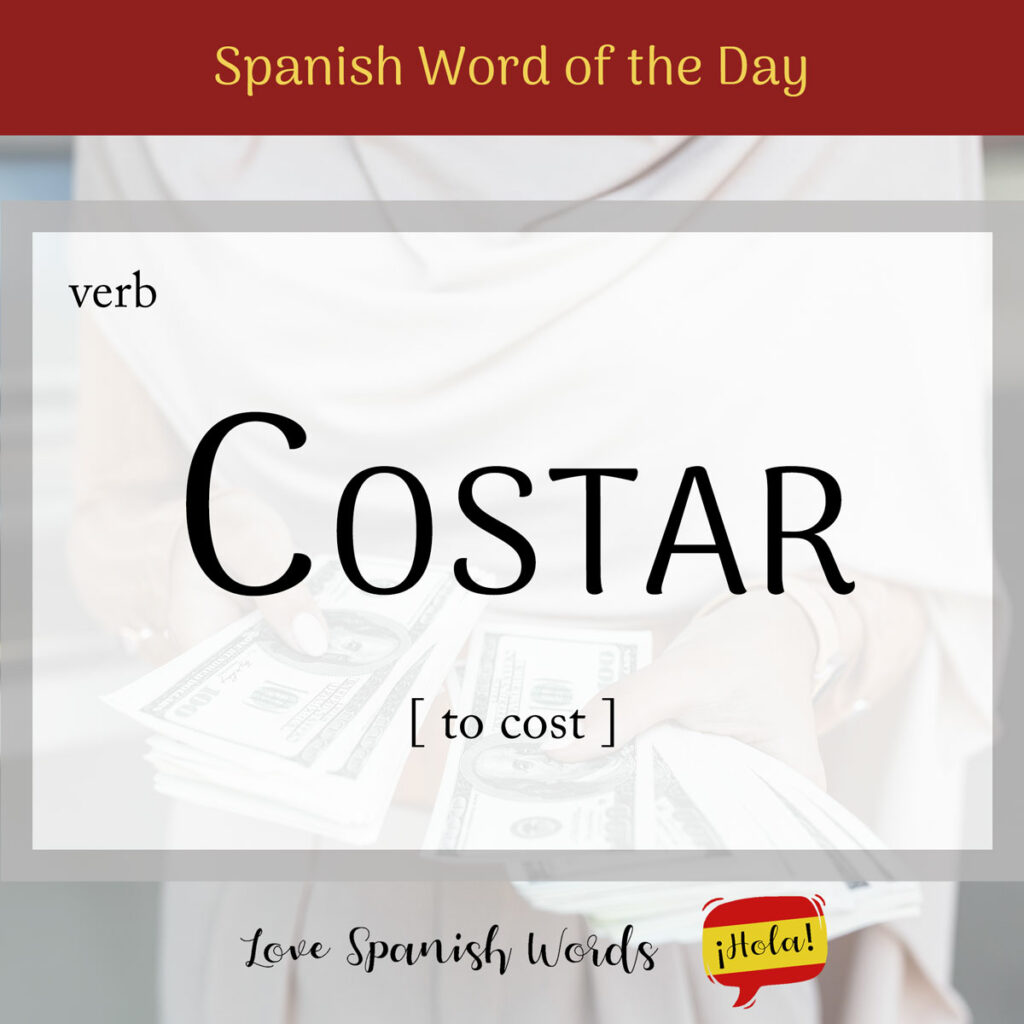The verb costar is one of the first you should learn if you are planning to visit a Hispanic country. Costar comes from the Latin verb constare, which means to stand firm or to consist of. Over time, this meaning evolved into having a price or requiring a certain effort or value.
Latin American Pronunciation
European Pronunciation

Nowadays, this word has two meanings. First, it can refer to a costo monetario (monetary cost), indicating the precio (price) of an object or service. Costar can also refer to the esfuerzo (effort) needed to do something or how difícil (difficult) something is, in which case it’s used in its reflexive form.
As a result, in some conversations, costar is used ambiguously, and the context helps clarify whether it refers to monetary cost or effort. For example, Esto me costó mucho could mean This was expensive for me or This was hard for me.
Me cuesta mucho levantarme temprano.
It’s hard for me to get up early.
Costar is an irregular verb in Spanish in the present tense and belongs to the -ar group of verbs. Below is its conjugation in the present and past tense:
- Yo cuesto (I cost)
- Tú cuestas (You cost)
- Él/Ella/Usted cuesta (He/She/You cost)
- Nosotros costamos (We cost)
- Vosotros costáis (You all cost)
- Ellos/Ellas/Ustedes cuestan (They/You all cost)
- Yo costé
- Tú costaste
- Él/Ella/Usted costó
- Nosotros costamos
- Vosotros costasteis
- Ellos/Ellas/Ustedes costaron
Costar is almost exclusively used in the third person (cuesta / cuestan) because it describes the price of an object or activity. It’s rare to say yo cuesto (I cost), except in very figurative or literary contexts.
¿Cuánto cuesta esta camisa?
How much does this shirt cost?
Costar captures the tangible and intangible costs associated with money, effort, and difficulty. In some countries, costar can be used in a similar way to express emotional or psychological difficulty. For example, me cuesta (it costs me) can imply an internal struggle or emotional effort.
When asking about prices, you might hear another verb: valer (to worth / value). Both costar and valer are often interchangeable when discussing the price of something, but each has its own nuances. Costar refers to the cost or effort required to obtain something while valer refers to the intrinsic value, worth, or usefulness of something. As a result, you can say either ¿Cuánto cuesta / cuestan? or ¿Cuánto vale / valen? (How much does it cost?)
Este coche cuesta / vale 20.000 euros.
This car costs 20,000 euros.

Keep in mind:
In English, a coma (comma ‘,’) is used to separate thousands (e.g., 1,000 for one thousand), and a punto (period ‘.’) is used for decimals (e.g., 10.5 for ten and a half). In Spanish, it’s the opposite: a punto (.) separates thousands (e.g., 1.000 for one thousand), and a coma (,) is used for decimals (e.g., 10,5 for ten and a half).

Spanish idioms featuring ‘costar’
Costar un ojo de la cara
Literal translation: to cost an eye from the face
English meaning: to cost an arm and a leg
Costar trabajo
Literal translation: to cost work
English meaning: this expression means that something takes a lot of effort or is challenging
Costar un riñón
Literal translation: to cost a kidney
English meaning: it means something is outrageously expensive
No me cuesta nada
Literal translation: It cost me nothing
English meaning: it indicates that something is easy to do or requires little effort, similar to no trouble

